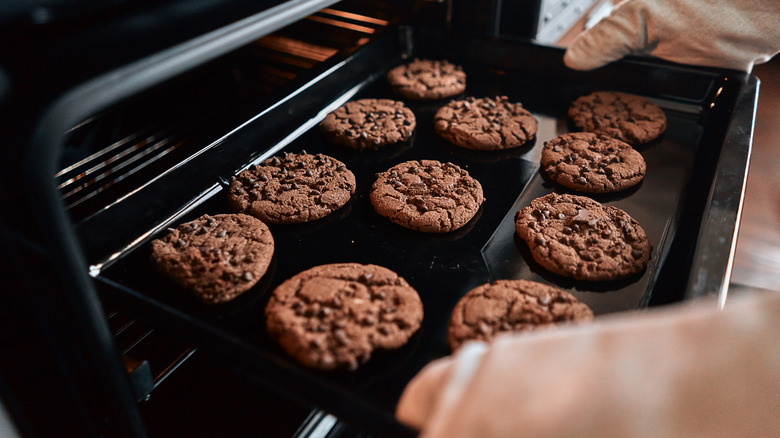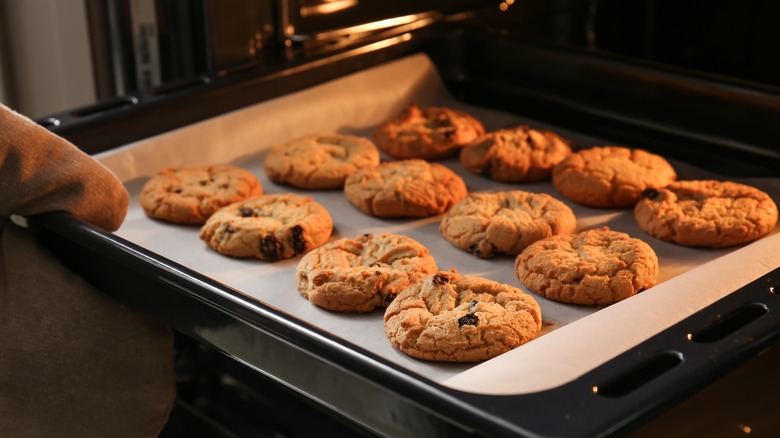Here's Why You Should Never Scoop Cookies Onto A Hot Baking Sheet
Not enough baking sheets to bake all of your batches of cookies? If you tend to put the next round of cookie dough onto the baking sheet you just used, you might run into a big problem.
Although this may seem like a great solution for bakers who don't have enough cookie sheets for all of their unbaked cookie dough, putting cookie dough on a still-warm cookie sheet can cause big problems. Instead of perfectly-shaped cookies, you'll end up facing a cookie issue that no baker likes, and you just might need a spatula to clean up the mess you got yourself into. Believe it or not, you're far better off simply investing in more cookie sheets or waiting to bake that next batch (if time allows, of course) than plopping balls of cookie dough on the baking sheet you just used to make cookies a few minutes ago. The reason why will help you solve one of the most irritating baking conundrums you face — and lead to far prettier cookies too.
Why you shouldn't put cookie dough on a hot baking sheet
Every cookie baker's worst nightmare is that moment when they've realized that they've placed those balls of cookie dough just a little bit too close together. Once they hit the oven and begin to spread, some of those cookies might clump together into bigger, more awkwardly shaped cookies.
The issue of "cookie spreading" isn't just limited to what happens in the oven, though. Heat from a warm baking sheet or grease from an overly greasy one can cause cookie dough to spread out before it even hits the oven for baking. Add this to 10 or so minutes of oven heat, and you'll have cookies that might spread into each other. Therefore, it's especially important that if you reuse baking sheets after the first round of baking, you've cooled the sheet down all the way and scrubbed off any grease from the previous cookies. If you have enough cookie sheets for the batches you want to bake, then absolutely don't reuse those baking sheets. Putting each batch on a clean sheet will ensure that the cookies don't spread too much.
Other ways to prevent your cookies from spreading
If you're putting each batch of cookie dough on its own baking sheet and still find that your cookies spread every time you bake, try turning down the oven temperature or adding a little less sugar. Both of these methods can yield cookies that spread slowly enough that you won't have a "cookie collision."
Oven temperature is one of the most common reasons that cookies spread. A higher oven temperature will result in more spread. As a matter of fact, King Arthur Baking Company's test kitchen baker tried baking the same cookie recipe at two different temperatures, 50 degrees apart. The cookies at the higher temperature melded into each other because of the increased heat exposure, while the cookies baked at a lower temperature remained apart. Another easy adjustment to make is the amount of sugar in the cookies. Sugar absorbs liquid. While you may not think about the amount of liquid in your cookie dough, heat can make sugar release its stored liquid, and you'll end up with an unsightly cookie clump. Looks aren't everything, but if you want your cookies to avoid spreading into each other, make sure your baking sheets are cool before you use them, and try these other methods to amplify the effectiveness of the baking sheet strategy. You'll have more defined cookies than ever before.


